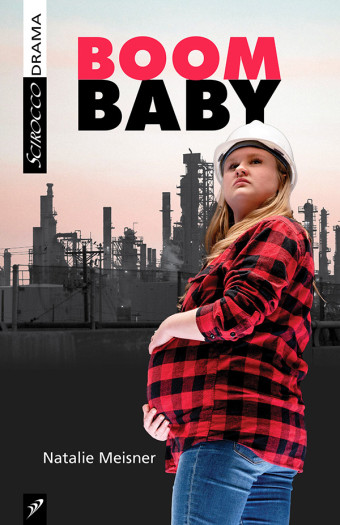The play our place by Toronto-based playwright, librettist, and screenwriter Kanika Ambrose is set in the fictionalized Caribbean restaurant Jerk Pork Castle in Scarborough. Working there without documentation are Andrea and Niesha from the imagined Caribbean countries of Caviva and Fanon. Rounding out the cast are Malcolm and Eldrick, the potential love interests.

- our place
- Kanika Ambrose
- J. Gordon Shillingford Publishing
- $16.95 Paperback, 80 pages
- ISBN: 978-19-90738-26-5
Stylistically, the characters speak dialects to match these imagined countries. They had to speak in dialect to be authentic, says Ambrose, but the choice to fictionalize the dialects was made to highlight the fact that these issues are Pan-Caribbean, not issues facing immigrants from only two specific countries.
Fanonian is written in a Dominican dialect melded with Haitian sounds and Creole, and Cavivan is written in the Jamaican dialect but with Guyanese resonances. This linguistic choice works.
our place was first produced by Cahoots Theatre and Theatre Passe Muraille in 2022, and it won the 2023 Dora Mavor Moore Award for Outstanding New Play.
Humorous and heartfelt, our place doesn’t shy away from complex topics and conversations. The audience is presented with Canada’s broken immigration system and its effect on people who are trying to make a better life for themselves and their families. Racism, housing insecurity, poverty, precarious work situations, exploitation, and the fear of deportation add to the characters’ plights.
Ambrose was curious about specific situations – such as risky relationships and precarious work – that immigrant women are placed in.
The play started out as two plays, one an investigation into the risks that a woman places on her body when going into a marriage of convenience, a marriage for documentation, says Ambrose. “The other person has such a huge advantage.”
The other was about two women who worked and lived together. Eventually, she realized they were the same characters.
After Ambrose developed the two women’s characters, getting to know them deeply, finding out their stories, and getting them to the end point, she recognized the importance of investigating the men’s stories in order to feel compassion for them without judgment.

“I wanted things to be obscured. I didn’t want anyone to be right or anyone to be wrong,” she says. “There’s only situation and circumstance. Each of these people is coming from specific circumstances that have brought them to the choices that they have made.”
Circumstances are also a part of another thread that runs through the play – the question of love.
“There’s an exploration of the theme of love and what it means to all of these people,” says Ambrose, “how the circumstances of your life can colour your understanding of love and what you accept as love.”
All of these investigations into serious issues and themes are presented with humour, and Ambrose says her family and culture have a lot to do with that.
“I’m observing it from a dual lens, from someone who has been immersed in Caribbean culture my whole life, but I also have a Canadian upbringing where I’m able to say, ‘This is unique and hilarious!’
“That makes me able to celebrate [my culture] and find the joy and bring it to my work.”













